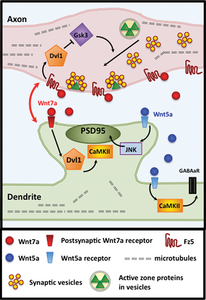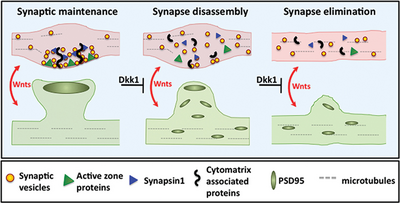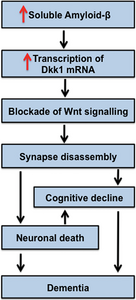Dickins, EM;
Salinas, PC;
(2013)
Wnts in action: from synapse formation to synaptic maintenance.
Frontiers in Cellular Neuroscience
, 7
, Article 162. 10.3389/fncel.2013.00162.

Preview |
PDF
fncel-07-00162.pdf Download (2MB) |
![[thumbnail of JPG Figure 1. A model for the function of Wnt signaling during synapse development and maintenance. ]](https://discovery.ucl.ac.uk/1433167/2.hassmallThumbnailVersion/fncel-07-00162-g001.jpg)  Preview |
Other (JPG Figure 1. A model for the function of Wnt signaling during synapse development and maintenance. )
fncel-07-00162-g001.jpg Download (231kB) |
![[thumbnail of JPG Figure 2. Wnt7a signals bi-directionally at vertebrate synapses. ]](https://discovery.ucl.ac.uk/1433167/3.hassmallThumbnailVersion/fncel-07-00162-g002.jpg)  Preview |
Other (JPG Figure 2. Wnt7a signals bi-directionally at vertebrate synapses. )
fncel-07-00162-g002.jpg Download (256kB) |
![[thumbnail of JPG Figure 3. Neuronal activity stimulates Fz5 mobilization to synapse cell surface. ]](https://discovery.ucl.ac.uk/1433167/4.hassmallThumbnailVersion/fncel-07-00162-g003.jpg)  Preview |
Other (JPG Figure 3. Neuronal activity stimulates Fz5 mobilization to synapse cell surface. )
fncel-07-00162-g003.jpg Download (248kB) |
![[thumbnail of JPG Figure 4. Wnt blockade by Dkk1 induces synapse disassembly. ]](https://discovery.ucl.ac.uk/1433167/5.hassmallThumbnailVersion/fncel-07-00162-g004.jpg)  Preview |
Other (JPG Figure 4. Wnt blockade by Dkk1 induces synapse disassembly. )
fncel-07-00162-g004.jpg Download (202kB) |
![[thumbnail of Figure 5. Model for Dkk1 in the progression of AD]](https://discovery.ucl.ac.uk/1433167/6.hassmallThumbnailVersion/fncel-07-00162-g005.jpg)  Preview |
Other (Figure 5. Model for Dkk1 in the progression of AD)
fncel-07-00162-g005.jpg Download (120kB) |
Abstract
A proper balance between synapse assembly and disassembly is crucial for the formation of functional neuronal circuits and synaptic plasticity in the adult brain. During development, synaptogenesis generates a vast excess of synapses, which are subsequently eliminated. Importantly, aberrant synaptic disassembly during development underpins many neurological disorders. Wnt secreted proteins are robust synaptogenic factors that regulate synapse assembly and function in the developing and mature brain. Recent studies show that Wnt blockade with the antagonist Dickkopf-1 (Dkk1) induces the rapid disassembly of synapses in mature neurons. Importantly, Dkk1 mediates synaptic loss induced by Amyloid-ß, a key pathogenic molecule in Alzheimer's disease (AD). These findings provide new insights into the potential contribution of dysfunctional Wnt signaling to synaptic loss observed in neurodegenerative diseases. In this review, we discuss the role of Wnt signaling in vertebrate synaptic assembly, function and maintenance, and consider how dysfunction of Wnt signaling could contribute to synaptic disassembly in neurodegenerative diseases such as AD.
| Type: | Article |
|---|---|
| Title: | Wnts in action: from synapse formation to synaptic maintenance |
| Open access status: | An open access version is available from UCL Discovery |
| DOI: | 10.3389/fncel.2013.00162 |
| Publisher version: | http://dx.doi.org/10.3389/fncel.2013.00162 |
| Language: | English |
| Additional information: | Copyright © 2013 Dickins and Salinas. This is an open-access article distributed under the terms of the Creative Commons Attribution License (CC BY). The use, distribution or reproduction in other forums is permitted, provided the original author(s) or licensor are credited and that the original publication in this journal is cited, in accordance with accepted academic practice. No use, distribution or reproduction is permitted which does not comply with these terms. PMCID: PMC3819050 |
| Keywords: | Dvl, Frizzled, LTP, neurodegenerative disease, synapse disassembly, synaptic plasticity, synaptogenesis |
| UCL classification: | UCL UCL > Provost and Vice Provost Offices > School of Life and Medical Sciences UCL > Provost and Vice Provost Offices > School of Life and Medical Sciences > Faculty of Life Sciences UCL > Provost and Vice Provost Offices > School of Life and Medical Sciences > Faculty of Life Sciences > Div of Biosciences UCL > Provost and Vice Provost Offices > School of Life and Medical Sciences > Faculty of Life Sciences > Div of Biosciences > Cell and Developmental Biology |
| URI: | https://discovery.ucl.ac.uk/id/eprint/1433167 |
Archive Staff Only
 |
View Item |


